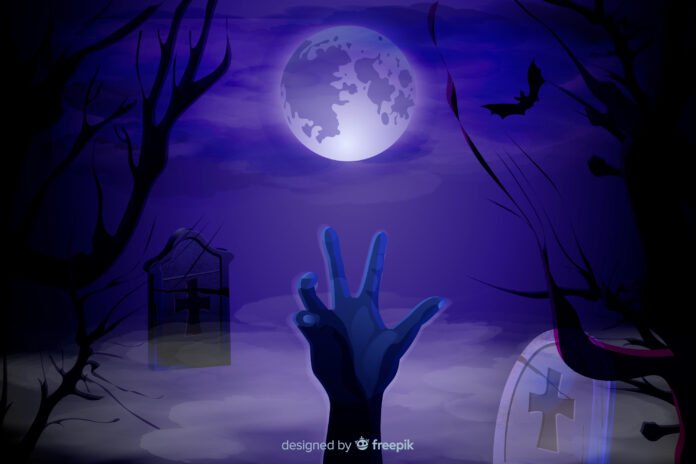Have you ever woken up due to a terrifying dream? Do you know that it may be a nightmare not a dream? Sometimes, nightmares seem so real that you wonder whether it was a dream or happened in reality. In some cases, you cannot differentiate between a nightmare or a night terror because the nightmare leaves you so frightened that you feel distressed and hopeless. However, whatever the age or gender you have, all of you experience nightmares and fear at some point of your life. But night terrors are something different. They are similar to nightmares to some extent but they do not happen commonly and you may need a therapist to get rid of them. so , what do you understand by the word night terror? You can easily differentiate the nightmare and night terror. As soon as you learn about the symptoms of each you can know the difference between nightmare and night terror. Then you will decide whether you need medical assistance for your night terrors or not?
Nightmare
Intensely dreadful dreams that provoke anger, disgust or fear in you are known as nightmares. Most people experience nightmares. They are not harmful for you except they interrupt your daytime life.
Night Terror
They are also known by another name, sleep terror. Night terrors are the episodes where you partially awake from your sleep due to extreme fear, stress or panic which you had experienced during sleep in the form of a dreadful dream. Often, you cannot remember the scenes you see in the dream. Your roommate or sleep partner often points out your desperate condition while you were waving your limbs during sleep.
According to studies, night terror is the form of parasomnia as they induce panic and terror in your dreams leading to shouting, screaming or thrashing about violently. The condition is usually linked with past-traumatic disorder and also affects your mental health. Although the condition is not taken as dangerous but if it causes aggression towards others, it may be a sign of a harmful condition. Some people experiencing night terror also complain about trouble sleeping. They should get medical care from others.
Nightmare vs. Night Terror
Intense dreams are nightmares while episodic awakening from sleep due to a bad or horrifying dream is a night terror. you partially awake from sleep and scream due to fear after a night terror. Second thing is nightmares are common but night terror does not happen commonly. Both nightmare and night terror often seem similar but they aren’t.
In addition, the main difference is the dream. If the dream is just horrifying and you don’t wake up after the frightening dream, it’s just a nightmare but the dreadful happening you experience during your sleep is a night terror. You often wake up from their panic.
Here are more key differences that may help you understand the fine line that makes nightmare different from night terror:
- Nightmares usually happen in the last half of the night while night terrors happen in the first half of sleep.
- Nightmares cause talking, yelling, crying or kicking during sleep while night terrors interrupt your sleep and you awake while kicking, sweating , running about, starting with open eyes and showing aggression to others.
- You can wake after a nightmare easily but it is often difficult to wake while having a night terror. You tried hard to wake up.
Keep on reading the article for a crash course in order to tell how nightmares and night terrors are apart.
Causes of Nightmares
Factors causing nightmares, include:
Trauma and Stress
Nightmares usually happen when you are passing through a traumatic or distressing phase of your life. Studies show that nightmares are actually the way adopted by your brain to rehearse your response to an upcoming danger. It is a fact that nightmare isn’t the exact way to reflect the actual threat but it provides a symbolic representation of a danger. For example, if you are experiencing a fear of departing an beloved one, you may dream about a strong slushy flood or strom that is taking you away from your loved one.
Moreover, traumatic loss also causes nightmares. People taking steps together in their post-traumatic stress disputes, often complain that they are repetitive or more frequent nightmares. The current nightmares are caused as the response of trauma. The nightmares can sabotage your sleep ability and disturb your life activities.
Early Childhood Experiences
According to studies, in a child, the brain remains in the developing stage till the age of 4. Anything bad happens in that duration the brain rushes its development as fear and stress. As an adult, your brain is less efficient than childhood. T cannot control negative emotions caused by childhood trauma. And it appears as a fear while you sleep. You become prone to nightmares due to childhood triggers.
In addition, the incidents happen in childhood if unpleasant, they cause stress while you’re in adult age. For example, a little scolding from your nanny is not a big deal when you’re a teenager but in childhood it causes severe stress and fear in your brain. This can be traumatic.
Medications
People often take medications to treat their underlying health conditions. Some of these medications increase the risk of nightmares happening. Such medications must be taken according to prescription. They may include:
Dopamine Agonists: These medications are used to treat your dental conditions that are the result of lack of dopamine (happiness) hormone in your body.
Selective Serotonin Reuptake Inhibitors (SSRIs): These are antidepressants used widely to treat anxiety and depression.
Beta-Blockers: These medicines are used to control high blood pressure and irregular heartbeat.
Causes of Night Terrors
When you are enjoying your deep sleep, but have a depressive mood disorder, you may experience night terrors. During this period the electrical waves of your brain become larger and slower than usual. That’s why this is known as the slow-wave sleep period. The reason for frequent night terrors is the result of transmission of mismatched brain waves during this phase of sleep. The clash between brain waves often causes throwing you off into a half-awake state of mind. This sudden clash and wake up jerk makes your heart racing and muscles stressed. However, your conscious self remains dormant and doesn’t know what’s going on. Now the question is which type of factors usually predispose you to night terrors. The answer is here:
Genetics: Specific genetic mutations are the leading cause of frequent sleep terrors.
Family History: If a family member from your family experiences night terrors, or bouts of sleep waking , there’s a greater risk of transferring this condition to you.
Sleep Disruption: Interrupted or disrupted sleep patterns often cause night terrors. Basic factors causing sleep disruption include fever, sleep apnea, and restless leg syndrome. These factors not only disrupt your sleep-wake but also throw your brain waves off-kilter.
Medications: Certain drugs for inducing deep sleep contain sodium oxybate or lithium. These ingredients make your sleep deeper that leads to frequent night terrors.
Are Night Terrors Common?
Night terrors are not so common. A small number of people suffer from this but in contrast, nightmares are common. However, both conditions affect children most of all.
Nightmares
According to an around the world estimation,almost 70 to 80% of children have recorded their nightmare experiences. A large number of children complained about frequent nightmares while some of them reported at least one nightmare. Strides also support the theory that children experience more nightmares than adults. The nightmares make them so distressed that most of the patents are also aware of it. Nightmares usually affect children around 3 years old to onward. However, after the age of 12 they became less common. Although nightmares are less frequent in adults, some adults experience nightmares even in their adulthood. People between 30 to 40 also often report about nightmares at least twice a month while nearly 10% of adults have been found with frequent nightmares like twice or thrice a week. This frequency of nightmares is known as nightmare disorder. In this condition, a person experiences vivid and upsetting nightmares. Nightmares can also be identified by certain symptoms, including:
- Daytime fatigue due to disrupted sleep schedule.
- Intrusive thoughts about the nightmares.
- Reluctance to fall asleep at night due to fear of nightmares.
- Anxiety attacks that happen due to waking up for many hours.
Night Terrors
They often occur in early childhood and get less frequent with age. A 2021 study showed that most children between the ages of 12 months to 12 years usually experience night terrors. They found that:
- 35-40% of children experience night terrors at the age of one and half years.
- 15-20% of children experience frequent night terriers at the age of 4 to 6 years.
- 5-10% of children experience night terrors around the age of 10 to 12.
However, some studies also suggest that a number of children start experiencing night terrors after the age of 5 years. But most f children were found with the night terrier disorder before the age of 5. Night terriers are often linked with history. So. Whenever you meet a child who’s experiencing night terrors, just ask them about its history of night terror.
In addition, night terrors became less frequent in adulthood. Only 2 to 3% of adults told about nightmare experiences. Some of them compiled about night terrors up to age 30. Studies show that experiencing night terriers in adulthood indicates the history of depression and anxiety that connects their sleep with night terror. But research is limited and cannot clarify if these conditions increase the risk of night terror. But night terror no doubt is a mental health disorder that obviously causes poor sleep, anxiety and panic attacks.
How to Handle Sleep Disruptions due to Night Terrors and Nightmares?
Night terrors and nightmares are totally different conditions. But they also share some factors that cause them. You can lower the frequency of both by observing and practicing some of the tips noted below:
- Try to lower the levels of stress especially during waking hours.
- Get enough sleep each night.
- Avoid alcohol and other caffeinated beverages especially near bedtime.
- Practice good sleep hygiene including the environment and temperature of your bedroom.
How Do Children Cope With?
Children are the main victim of night terrors and nightmares. But most of them don’t know how to cope with the condition. They need help to handle the condition. You can calm down your child after a nightmare by cuddling with them. Provide the toys which can be their sleep partners and realize that they aren’t alone. Calm reassurances and your company can help them cope with it. Try to give them confidence and peace by keeping there and your bedroom doors open throughout the night. This step will make them think that you’re with them always and they can believe you in every after. Creating a sense of security by staying around them in their bedroom is another level of care that helps them handle their fear.
However, in case of night terror, your child may not be able to describe their terror or fear. They would feel difficulty in waking up but start shaking and shouting due to panic that makes the situation worsen. You cannot intervene in such a situation,until you feel the danger that a child may cause harm themselves. In some cases. Children star w;king i sleep. If they are willing, don’t interrupt them. Wait for a while and when they are conscious, guide them to go to bed. They would follow your instructions and go to sleep peacefully. If they experience night-orbit and can’t wake up, hug them and realize that they are safe by laying beside them. These reassurances of security will calm them down.
Conclusion
Disturbing dreams that you can clearly remember on waking up are known as night mares while your shouting, yelling and screaming during sleep at night due to a fearful dream that you can’t remember on waking up, is called night terror. Both conditions affect children more than adults and have some history of depression or stress.
Reducing stress, having a good sleep, and processing the trauma that triggers the both conditions can help treat nightmares and night terrors. These steps may help you reduce the frequency of nightmares or night terrors. If you have a loved one fighting with these conditions, a hug, cuddling or staying with them at night can create a sense of security in them, that may help them handle the condition.







